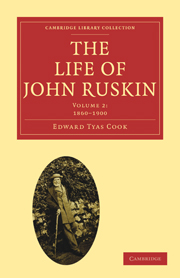Book contents
- Frontmatter
- Contents
- CHAPTER I UNTO THIS LAST (1860)
- CHAPTER II EXILE (1861–1863)
- CHAPTER III BOULOGNE—LUCERNE—MILAN (1861–1862)
- CHAPTER IV MORNEX—MUNERA PULVERIS (1862–1863)
- CHAPTER V HOME LIFE AT DENMARK HILL (1864–1866)
- CHAPTER VI SESAME AND LILIES—THE GROWN OF WILD OLIVE—THE ETHICS OF THE DUST (1865, 1866)
- CHAPTER VII TIME AND TIDE (1866, 1867)
- CHAPTER VIII RUSKIN's POLITICAL ECONOMY
- CHAPTER IX ABBEVILLE AND VERONA (1868, 1869)
- CHAPTER X OXFORD PROFESSOR (1870–1878)
- CHAPTER XI FIRST OXFORD LECTURES (1870, 1871)
- CHAPTER XII A DARK YEAE (1871)
- CHAPTER XIII BOTTICELLI (1872, 1873)
- CHAPTER XIV WITH ST. FRANCIS AT ASSISI (1874)
- CHAPTER XV THE END OF A ROMANCE (1875)
- CHAPTER XVI HOME LIFE AT BRANTWOOD (1872–1876)
- CHAPTER XVII VENICE REVISITED (1876–1877)
- CHAPTER XVIII FORS CLAVIGERA (1871–1878)
- CHAPTER XIX THE ST. GEORGE'S GUILD
- CHAPTER XX THE RUSKIN MUSEUM
- CHAPTER XXI SCHOOLS OF ST. GEORGE
- CHAPTER XXII ARROWS OF THE CHACE
- CHAPTER XXIII “THE DREAM” (1877–1878)
- CHAPTER XXIV STUDIES OF FLOWERS AND ROCKS (1878)
- CHAPTER XXV RETURN TO WORK (1878–1880)
- CHAPTER XXVI THE BIBLE OF AMIENS. FURTHER ILLNESSES (1880–1882)
- CHAPTER XXVII SECOND PROFESSORSHIP AT OXFORD (1882–1885)
- CHAPTER XXVIII PRÆTERITA (1885–1889)
- CHAPTER XXIX OLD AGE AND LAST WORKS (1886–1889)
- CHAPTER XXX CLOSING YEARS (1889–1900)
- CHAPTER XXXI CHARACTERISTICS
- CHAPTER XXXII INFLUENCE
- INDEX
CHAPTER XI - FIRST OXFORD LECTURES (1870, 1871)
Published online by Cambridge University Press: 07 September 2011
- Frontmatter
- Contents
- CHAPTER I UNTO THIS LAST (1860)
- CHAPTER II EXILE (1861–1863)
- CHAPTER III BOULOGNE—LUCERNE—MILAN (1861–1862)
- CHAPTER IV MORNEX—MUNERA PULVERIS (1862–1863)
- CHAPTER V HOME LIFE AT DENMARK HILL (1864–1866)
- CHAPTER VI SESAME AND LILIES—THE GROWN OF WILD OLIVE—THE ETHICS OF THE DUST (1865, 1866)
- CHAPTER VII TIME AND TIDE (1866, 1867)
- CHAPTER VIII RUSKIN's POLITICAL ECONOMY
- CHAPTER IX ABBEVILLE AND VERONA (1868, 1869)
- CHAPTER X OXFORD PROFESSOR (1870–1878)
- CHAPTER XI FIRST OXFORD LECTURES (1870, 1871)
- CHAPTER XII A DARK YEAE (1871)
- CHAPTER XIII BOTTICELLI (1872, 1873)
- CHAPTER XIV WITH ST. FRANCIS AT ASSISI (1874)
- CHAPTER XV THE END OF A ROMANCE (1875)
- CHAPTER XVI HOME LIFE AT BRANTWOOD (1872–1876)
- CHAPTER XVII VENICE REVISITED (1876–1877)
- CHAPTER XVIII FORS CLAVIGERA (1871–1878)
- CHAPTER XIX THE ST. GEORGE'S GUILD
- CHAPTER XX THE RUSKIN MUSEUM
- CHAPTER XXI SCHOOLS OF ST. GEORGE
- CHAPTER XXII ARROWS OF THE CHACE
- CHAPTER XXIII “THE DREAM” (1877–1878)
- CHAPTER XXIV STUDIES OF FLOWERS AND ROCKS (1878)
- CHAPTER XXV RETURN TO WORK (1878–1880)
- CHAPTER XXVI THE BIBLE OF AMIENS. FURTHER ILLNESSES (1880–1882)
- CHAPTER XXVII SECOND PROFESSORSHIP AT OXFORD (1882–1885)
- CHAPTER XXVIII PRÆTERITA (1885–1889)
- CHAPTER XXIX OLD AGE AND LAST WORKS (1886–1889)
- CHAPTER XXX CLOSING YEARS (1889–1900)
- CHAPTER XXXI CHARACTERISTICS
- CHAPTER XXXII INFLUENCE
- INDEX
Summary
“I conceive it to be the function of this Professorship to establish both a practical and critical school of fine art for English gentlemen: practical, so that, if they draw at all, they may draw rightly; and critical, so that, being first directed to such works of existing art as will best reward their study, they may afterwards make their patronage of living artists delightful to themselves in their consciousness of its justice, and, to the utmost, beneficial to their country.”
—Lectures on Art.Ruskin gave his first lecture at Oxford on February 8, 1870. It had been announced for the Theatre in the Museum, but long before the appointed hour the room was so densely crowded, and there were so many disappointed of admission, that Acland begged the audience to adjourn, with the lecturer at their head, to the Sheldonian Theatre—the place where, thirty-one years before, he had recited his prize poem. There had been no such scene in Oxford since 1841, when Dr. Arnold gave his inaugural lecture as Professor of Modern History. The attendance remained very large, though Ruskin declined to repeat the experiment of lecturing in so large a room. At various times he made efforts to exclude the ladies, who threatened, by their greater pertinacity, to oust the University men, and many of his subsequent courses were delivered twice—first to the University, and then to a general audience.
The Inaugural Lectures were published shortly after their delivery by the Clarendon Press. Ruskin not unjustly regarded these Lectures on Art as being one of his principal works. On the general topics treated in Lectures i.–iv.— the place of art in University education,
- Type
- Chapter
- Information
- The Life of John Ruskin , pp. 202 - 213Publisher: Cambridge University PressPrint publication year: 2010First published in: 1911

